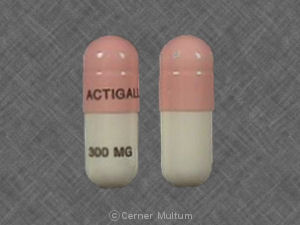What is Actigall (Ursodiol)?
 Ursodiol is a bile acid that decreases the amount of cholesterol produced by the liver and absorbed by the intestines. Ursodiol helps break down cholesterol that has formed into stones in the gallbladder. Ursodiol also increases bile flow in patients with primary biliary cirrhosis.
Ursodiol is a bile acid that decreases the amount of cholesterol produced by the liver and absorbed by the intestines. Ursodiol helps break down cholesterol that has formed into stones in the gallbladder. Ursodiol also increases bile flow in patients with primary biliary cirrhosis.
Ursodiol is used to treat small gallstones in people who cannot have gallbladder surgery, and to prevent gallstones in overweight patients undergoing rapid weight loss. Ursodiol is also used to treat primary biliary cirrhosis.
Ursodiol is not for treating gallstones that are calcified.
Ursodiol may also be used for purposes other than those listed in this medication guide.
What is the most important information I should know about Actigall (Ursodiol)?
Before taking ursodiol, tell your doctor if you are also taking cholestyramine (Questran), colestipol (Colestid), or estrogens (birth control pills or hormone replacement).
Avoid using antacids without your doctor’s advice. Use only the specific type of antacid your doctor recommends. Antacids contain different medicines and some types can make it harder for your body to absorb ursodiol.
To treat gallstones, you may have to take ursodiol for several months, and not all gallstones may completely dissolve. Many people who use this medicine will develop gallstones again within 5 years after treatment with ursodiol. Talk to your doctor about your specific risks for repeated gallstones.
To be sure this medication is helping your condition, your doctor may perform ultrasound examinations of your gallbladder on a regular basis. Your liver function may also need to be tested. Do not miss any scheduled visits to your doctor.
What should I discuss with my healthcare provider before taking Actigall (Ursodiol)?
Before using this medication, tell your doctor if you are allergic to any drugs, or if you have liver disease.
FDA pregnancy category B. This medication is not expected to be harmful to an unborn baby. Tell your doctor if you are pregnant or plan to become pregnant during treatment.
It is not known whether ursodiol passes into breast milk or if it could harm a nursing baby. Do not use this medication without telling your doctor if you are breast-feeding a baby.
To treat gallstones, you may have to take ursodiol for several months, and not all gallstones may completely dissolve. Many people who use this medicine will develop gallstones again within 5 years after treatment with ursodiol. Talk to your doctor about your specific risks for repeated gallstones.
Actigall Side Effects
What are the possible side effects of Actigall (Ursodiol)?
Get emergency medical help if you have any of these signs of an allergic reaction: hives; difficulty breathing; swelling of your face, lips, tongue, or throat.
Other less serious side effects are more likely to occur, such as:
- fever, chills, body aches, flu symptoms
- stomach pain, nausea, diarrhea, constipation
- dizziness, tired feeling
- back pain
- runny or stuffy nose, cold symptoms; or
- headache
Side effects other than those listed here may also occur. Talk to your doctor about any side effect that seems unusual or that is especially bothersome. You may report side effects to FDA at 1-800-FDA-1088.
Actigall Interactions
What other drugs affect Actigall (Ursodiol)?
Before taking ursodiol, tell your doctor if you are using any of the following drugs:
- cholestyramine (Questran)
- colestipol (Colestid)
- estrogens (birth control pills or hormone replacement); or
- antacids that contain aluminum, such as Rolaids, Mylanta, or Maalox)
If you are using any of these drugs, you may not be able to use ursodiol or you may need dosage adjustments or special tests during treatment.
There may be other drugs not listed that can affect ursodiol. Tell your doctor about all the prescription and over-the-counter medications you use. This includes vitamins, minerals, herbal products, and drugs prescribed by other doctors. Do not start using a new medication without telling your doctor.
What should I avoid while taking Actigall (Ursodiol)?
Avoid using antacids without your doctor’s advice. Use only the specific type of antacid your doctor recommends. Antacids contain different medicines and some types can make it harder for your body to absorb ursodiol.
Actigall Dosage
How should I take Actigall (Ursodiol)?
Take this medication exactly as it was prescribed for you. Do not take the medication in larger amounts, or take it for longer than recommended by your doctor. Follow the instructions on your prescription label.
Take each dose with a full glass of water. The medication can be taken with meals unless your doctor tells you otherwise.
To be sure this medication is helping your condition, your doctor may perform ultrasound examinations of your gallbladder on a regular basis. Your liver function may also need to be tested. Do not miss any scheduled visits to your doctor.
It may take several months of taking ursodiol before your gallstones dissolve. Take this medication for the entire length of time prescribed by your doctor.
It is important to take ursodiol regularly to get the most benefit. Get your prescription refilled before you run out of medicine completely.
Store ursodiol at room temperature away from heat, moisture, and light.
What happens if I overdose on Actigall (Ursodiol)?
Seek emergency medical attention if you think you have used too much of this medicine.
An overdose of ursodiol is likely to cause diarrhea.
What happens if I miss a dose of Actigall (Ursodiol)?
Take the missed dose as soon as you remember. If it is almost time for your next dose, skip the missed dose and take the medicine at the next regularly scheduled time. Do not take extra medicine to make up the missed dose.
Edited from everydayhealth.com
